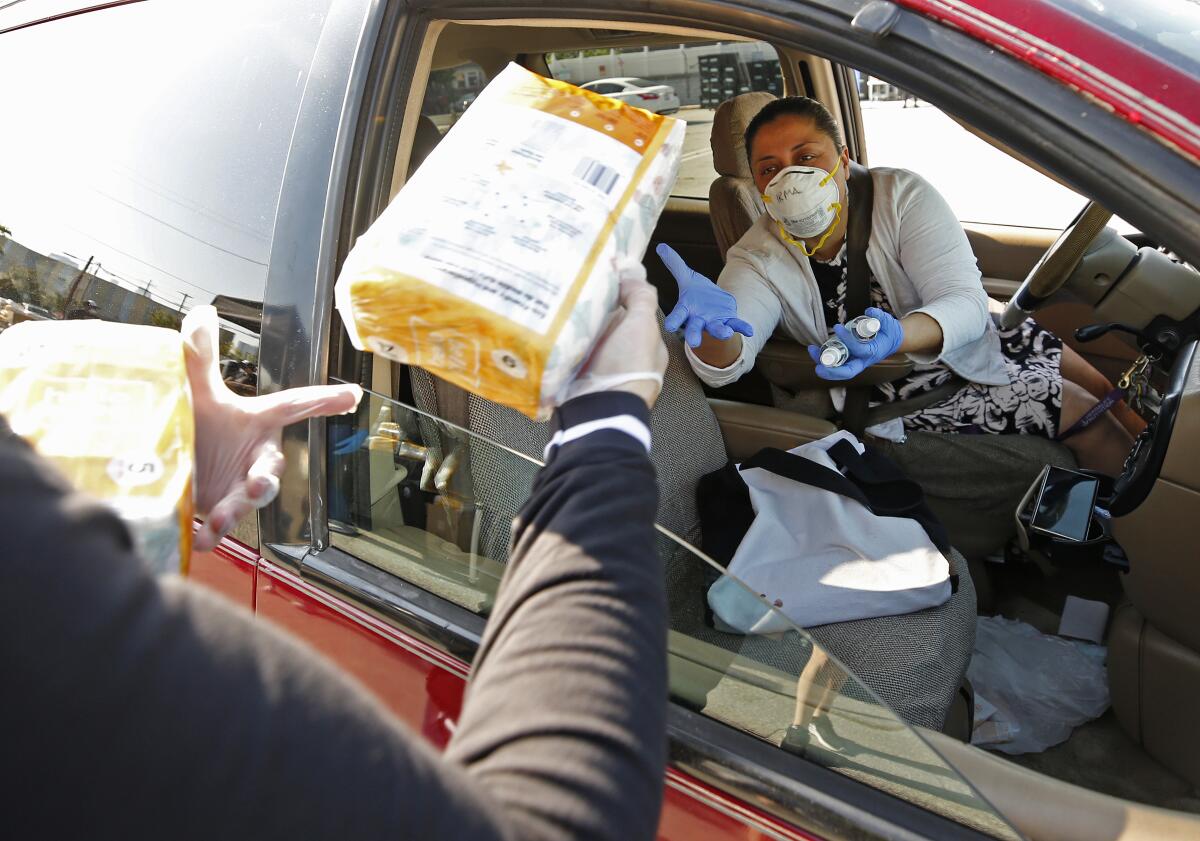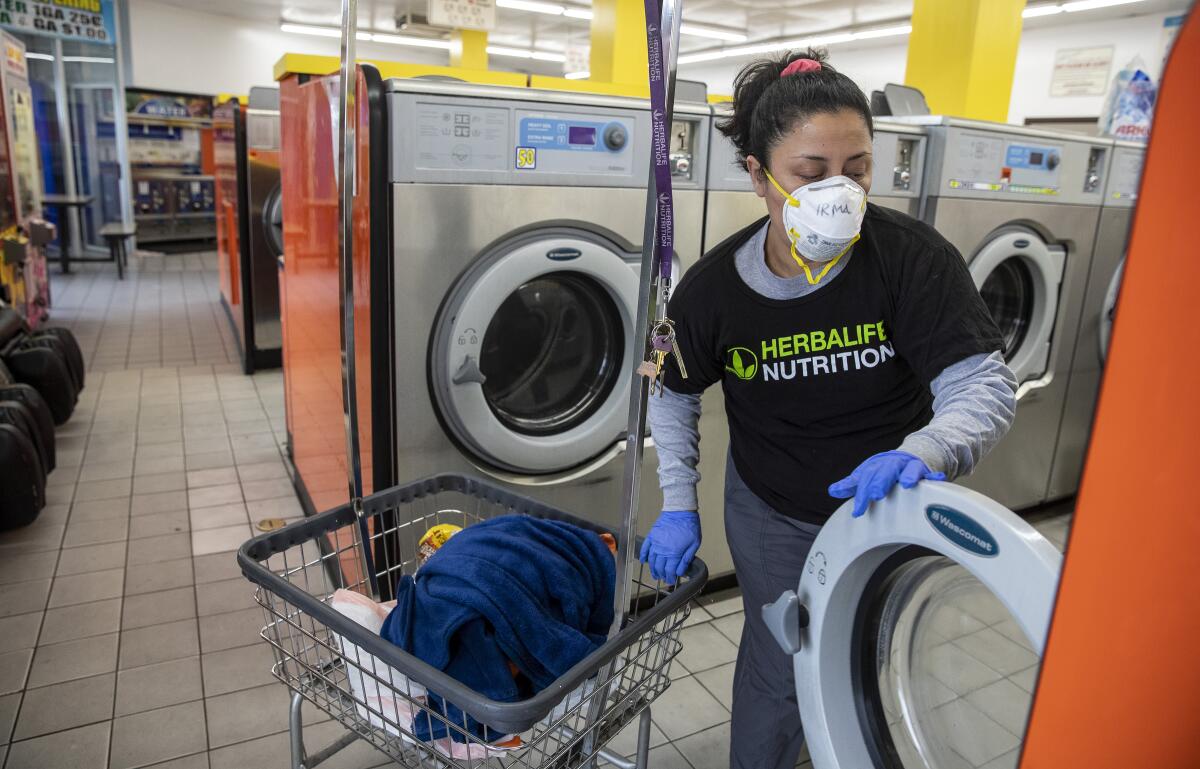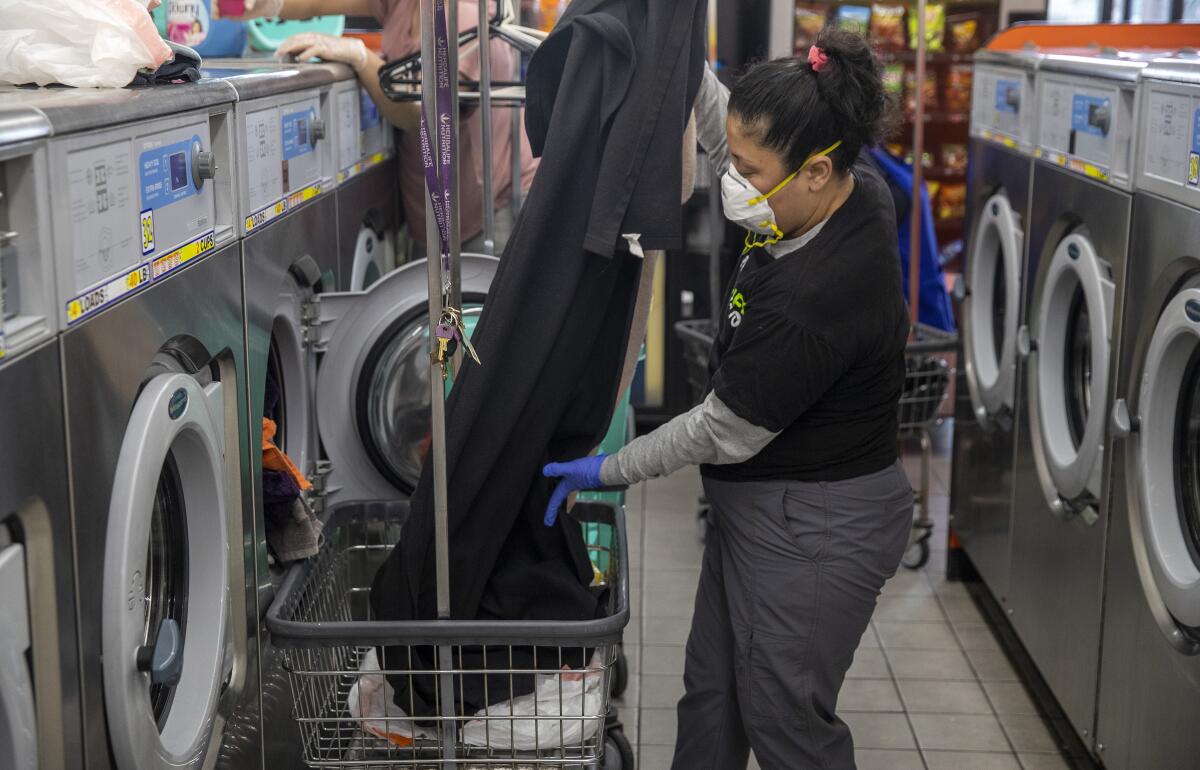‘What if I run out?’ Cost of diapers and rush to potty train strain low-income parents

- Share via
Irma Juárez peeled back her sunshine-colored curtains one drizzly recent morning to count cars at the 24-hour self-service laundry across the street from her Pico-Union apartment.
She would have to be quick: Weekends were always busy, and now only 10 people at a time were allowed in. Fights broke out over the washers. Fear hung like dryer exhaust in the air.
It was also the first time in weeks that she’d scraped together enough quarters for laundry, and her children were quickly running out of clean clothes. Recently, she’d picked the princess decal off 4-year-old Beatríz’s outgrown shorts and inked a spider over them for her 3-year-old, Máximo to entice him to wear his sister’s hand-me-down. The success was short-lived. Since she’d run out of diapers, nothing stayed dry very long.
“They just opened a store right here — they ran out of diapers like this,” Juárez said with a snap, nodding to a market across from the laundry center. “I went down here to MacArthur Park, they didn’t have any. I went to Costco, they didn’t have any. I went to Target, sold out. I’m here with the kids, going store to store, and they didn’t have any supplies.”
In desperation, she began hand-washing dirty disposable diapers and hanging them to dry in the shower. At that point, she felt she had no choice.
“On that day, I started potty training him,” she said.
Toilet training is difficult under the best of circumstances. But the pandemic has put unprecedented pressure on poor parents like Juárez, who pay about as much to diaper a child as an average L.A. family spends on their electric bill — about $80 a month. Here, as elsewhere, poverty extracts a premium, limiting where families can get supplies and their ability to buy in bulk, experts said. With store shelves stripped and more than half of Angelenos out of work, families like hers are scrambling to cut that cost.
Federal safety-net programs don’t pay for diapers, and California’s first-in-the-nation diaper assistance program is too limited to fill the yawning need. Those without cars now avoid public transit, meaning they must rely on local markets where inventory is tight and prices have soared.
“The smaller markets on the corner, they’re jacking the price of the Pampers up so you can only afford the six-pack instead of the 12-pack,” said Alan-Michael Graves, national program director for the Good+Foundation, a nonprofit organization providing diapers in Los Angeles and New York. “If you add cost plus availability, it makes it very challenging for parents to provide these diapers to their kids.”
Juárez counts herself luckier than most — her children attend a daycare center run by Pathways LA, a nonprofit that recently partnered with Children’s Bureau and the boutique baby company Hello Bello to distribute 56,000 diapers to families like hers.
A recent drive-through distribution event started at 7:30 a.m., half an hour ahead of schedule, because the line of cars was already looped around the block. By 10 a.m., most sizes had run out.
“They’re like gold to the families we serve,” said Norah Weinstein of Baby2Baby, a local diaper bank that has partnered with the L.A. Unified School District to provide supplies to families in need. “Parents in our program are emptying out diapers, hanging them to dry and putting them back on their babies. They’re using newspaper as a substitute for diapers, they’re not eating so they can provide diapers and food for their children.”
Baby2Baby distributes about 800,000 diapers a month. Since California’s Safer-at-Home order came down in March, they’ve handed out more than 3.6 million.
“The need in L.A. is just astronomical,” said Lisa Truong, co-founder of the Bay Area nonprofit Help a Mother Out, which runs the San Francisco Diaper Bank. “There’s a tsunami of need.”
But she warned against rushing to potty train, as some L.A. families say they are doing now.
“If you’re thinking about whether you’re going to eat or diaper your baby, you probably don’t have a lot of money to do your laundry every week,” she said. “The families we serve, they’re already dealing with so many stressors — [potty training is] the last thing we want to ask them to do.”
That’s because the path out of Pampers winds through the coin laundry, where cloth diapers are forbidden and potty-training accidents become costly extra loads. Like most children their age, both Beatríz and Máximo still wet the bed. Juárez has been washing her daughter’s Frozen sheets and her son’s Spiderman comforter by hand, but they don’t really get clean without regular runs through the Speed Queen on hot.
“I had piles of clothes full of everything,” Juárez said. “If I wash it, then the next day they’re peeing on the bed. Then you have to wash everything all over again.”
But the alternative to potty training — Máximo’s soft toddler skin flecked with the crystallized filling from a reused disposable diaper, red and angry with rash — is unbearable to her.
“I have to change clothes for them two to three times a day,” Juárez said. “I’m stressed, because what if I run out of diapers again?”

In environmentally conscious California, cloth diapers would seem the obvious answer. That was Assemblywoman Lorena Gonzalez’s first thought when she began championing subsidized diaper programs in 2013.
“This is a struggle so many working-class women face all the time,” the San Diego Democrat said. “I’m a big environmentalist, but I gave up that [cloth diaper] fight.”
The reason is that the same families who can’t afford disposable diapers also lack the resources that make cloth diapering possible. It’s illegal to wash reusable diapers in a self-serve laundry, and publicly subsidized childcare centers like the one Juárez’s children attend require low-income working parents to provide disposable ones.
“We would get hate mail” for distributing disposable diapers in San Francisco, Truong said. “But it’s a position of privilege to have that option [of cloth]. I have a washing machine and a dryer. I’m not going to ask a mom living in an SRO [a rented room, often without appliances] in Chinatown to do cloth diapers.”
California is also the only state that provides any public funding for diapers.
In San Francisco, families receiving CalFresh or CalWORKs benefits get free diapers through local distribution centers. Elsewhere in the state, such parents get $30 a month in diaper assistance, while food banks in Los Angeles, San Diego, Orange County and Fresno offer a limited number of state-funded supplies to families in need.
But those resources were stretched before the pandemic. Since coronavirus hit, the long-simmering crisis has boiled over.
“We wanted to have one more child, but diapers are expensive” Juárez said as she counted her quarters into the washer. “That was our main discussion, that it’s just too much money with diapers. We said, forget it, we’re not going to have any more.”

Like millions of others, Juárez lost her small business to the pandemic, and has watched her husband’s work evaporate as stay-at-home orders were extended. Choosing between laundry and diapers with no money for either has put a strain on both parents.
“Sometimes we’ll end up fighting because he doesn’t have any [clean] clothes and he needs to go to work. He’s stressing himself right now, not only with laundry, not only with diapers, but overall,” she said.
There have been brief glimmers of hope — a diaper giveaway, an Angeleno card — but most are quickly snuffed out. Instead, she’s turned to her faith, replacing lullabies with “Ave Maria” and praying the rosary with her children.
Juárez prays in the dark every night as Beatríz cuddles against her and Máximo drifts off to sleep.
She prays for the pandemic to end.
She prays that her husband finds work, that they’ll have money for rent and to keep the lights on.
She prays that her children are spared from the virus.
She prays that they don’t wet the bed.
More to Read
Sign up for Essential California
The most important California stories and recommendations in your inbox every morning.
You may occasionally receive promotional content from the Los Angeles Times.











